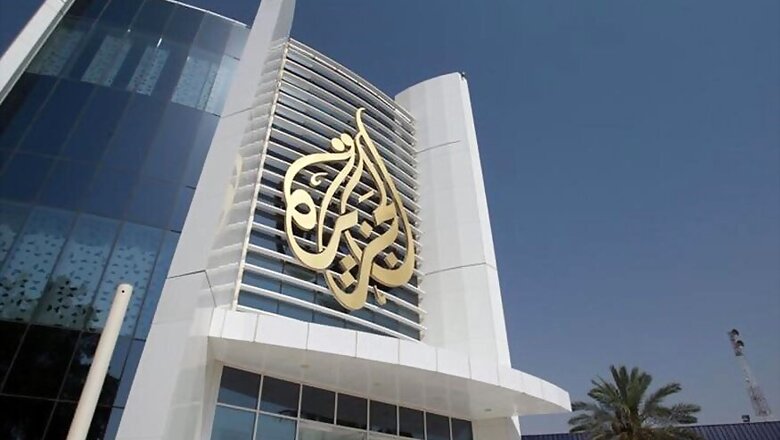
views
Doha: The Arabic news network Al-Jazeera has been thrust into the centre of the story as Qatar came under virtual siege by its Gulf neighbours, pressuring it to shut down the TV channel that has infuriated them with its coverage for 20 years.
Saudi Arabia, the United Arab Emirates, Bahrain and Egypt severed ties with Qatar this week over allegations it supports terrorism and, more specifically, that it uses Al-Jazeera as a mouthpiece to destabilise the region.
The Qatar-based network, one of the most widely seen Arabic channels in the world, had long angered Mideast governments, since at its start it was one the few that presented alternative viewpoints.
Critics say it has in past years turned to promoting Islamist movements as a tool of Qatar's foreign policy. The region's rulers see many of these movements, including the Muslim Brotherhood, as threats.
Qatar and the station deny the accusations. Qatar's foreign minister told The Associated Press there was no way the country would silence Al-Jazeera, which says its channels reach 100 countries and 310 million homes worldwide.
"If anyone thinks they are going to impose anything on my internal affairs or my internal issues, this is not going to happen. We are an independent country with our own sovereignty," said Sheikh Mohammed bin Abdulrahman Al Thani.
He said the allegations are based on "false and fabricated news."
But as Qatar became more isolated this week, so too did Al-Jazeera. Qatar's opponents shut down access to the channel and its affiliate websites in their territories two weeks ago.
On Monday, they blocked airspace to Qatari flights; Saudi Arabia sealed Qatar's only land border; and it and Jordan closed Al-Jazeera offices on their soil. Qatar's opponents reportedly demand a slate of actions, including shutting down or dramatically changing the tone of the network.
The UAE's Minister of State for Foreign Affairs Anwar Gargash said the decision to block the channel is "not about Al-Jazeera, it's not about the media."
"The media aspect of it is part of what I would say an overall support for extremism," he said.
Al-Jazeera and Qatar have been intertwined since it was launched in 1996, with financial backing from the ruling emir at the time, Sheikh Hamad bin Khalifa Al Thani — just months after the Qataris accused Saudi Arabia of a failed coup attempt.
Throughout its existence, the station has been mostly funded by the Qatari government. Its chairman is a member of Qatar's ruling Al Thani family.
Energy-rich Qatar has long pursued an ambitious foreign policy, bucking many of the stances of Saudi Arabia and its fellow Sunni monarchies in the Gulf. For example, it has maintained good ties with Iran, Saudi Arabia's regional nemesis, and backed the Brotherhood, which Gulf governments and Egypt have branded a terrorist group.
Similarly, Al-Jazeera has been a renegade in the Arab media landscape. American viewers became familiar with Al-Jazeera after the attacks of Sept. 11, 2001, when its golden-hued Arabic logo became synonymous with video messages by America's then-Most Wanted Terrorist, Osama bin Laden.
The channel aired the messages it received, sparking frequent complaints by then-President George W. Bush's White House. The station defended its policy, saying the messages were newsworthy.
Al-Jazeera was the first Arab satellite news channel to offer a range of views outside of heavily censored state media. It was the first Arab-owned news outlet to host Israeli officials and commentators, which some analysts note coincided with Qatar's ties with Israel at the time.
Acting Director General of the Al-Jazeera Media Network, Mostefa Souag, told the AP he believes Al-Jazeera is being targeted because "we tell the truth."
"Certain people maybe don't like the truth," he said, or possibly too because of the network's "relationship with Qatar."
"Al-Jazeera is going to continue with its editorial policy. We're doing the job to the best that we can," he added.
Bassam Awaidah, media professor at Bir Zeit University in the West Bank, said despite Al-Jazeera's insistence that it is editorially independent, the region's media are tools in the hands of governments.
"Al-Jazeera's coverage is clearly biased in favor of Hamas and the Muslim Brotherhood," Awaidah said.
"When there is a Hamas wrongdoing, Al-Jazeera hides it, and when a similar or lesser action comes from (the rival) Palestinian Authority, Al-Jazeera reports it and exaggerates it."
Al-Jazeera's counterweight is largely seen as Al-Arabiya, a Saudi-owned news channel that closely reflects Saudi policy.
It was launched Al-Arabiya launched in 2003, the year after Al-Jazeera's coverage of a Saudi peace plan with Israel prompted the kingdom to pull its ambassador from Qatar for six years.
Al-Arabiya and other media outlets across the Gulf and Egypt have released an avalanche of criticism of Qatar, accusing it of terrorist activities. Saudi Arabia, the UAE and Bahrain warned that anyone who supporting Qatar on social media could be fined and jailed.
Over the years, Al-Jazeera's reporters have not been spared the region's politics and violence.
One of its reporters was killed by US fire in Iraq in 2003, though Qatar says it had supplied the military with its office's coordinates to avoid being targeted. Its bureau in Kabul was hit in 2001 by the US.















Comments
0 comment